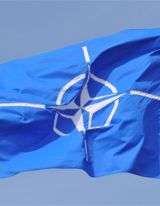On the eve of the Chicago summit, a new Atlantic Council report argues for the enduring importance of NATO, and calls for renewed leadership from the Alliance’s members to ensure NATO’s vibrancy in the decade to come.
Published today by the Atlantic Council, Anchoring the Alliance argues that NATO is a force multiplier for the United States and remains essential to addressing the security challenges of a globalized world. R. Nicholas Burns – Atlantic Council Board director, former under secretary of state, and former US ambassador to NATO – served as the project chairman, with Atlantic Council executive vice president Damon Wilson as the project director, and International Security Program deputy director Jeff Lightfoot served as rapporteur. In the report, Burns argues that for NATO to remain central in the coming decade, the United States will have to provide strong leadership of the Alliance, Europe must maintain its aspirations for global leadership, and the Alliance as a whole must strengthen its engagement with global partners.
The report also calls for greater leadership from individual members of the Alliance. While all NATO members have unique and essential contributions to make, “the responsibility for NATO’s future vitality falls disproportionately heavily on the United States, Germany, France, the United Kingdom, and Turkey, and the steps they now take toward recommitting to the Alliance.”
The report outlines ways in which individual members can assert leadership within the Alliance. Some highlights include:
- The United States must avoid undermining its military supremacy through an additional $492 billion in cuts to defense spending as a result of sequestration, and should ensure that it ‘pivots’ to Asia with Europe.
- Germany must match its economic power with the strategic ambition and military capability to contribute more strongly to Alliance operations worldwide.
- New French president François Hollande must ensure that France’s return to NATO’s integrated command structure and its newfound Atlanticist instincts become enduring elements of French strategy.
- Within the next decade, the Alliance should welcome Turkey into the top tier of leading allies by selecting its first Turkish Secretary General, provided that Turkey does more to deepen democracy at home and settle its regional disputes.
- The United Kingdom must not allow deep defense reductions to undermine its special status as one of NATO’s most capable members. The Cameron government should keep its pledge to increase its defense investments after 2015.
“If we didn’t have NATO in 2012, we would still want an organization exactly like it,” Ambassador Burns said at the report’s launch at the Atlantic Council today. “NATO really matters.”
The Atlantic Council’s International Security Program shapes and influences the debate on international security by facilitating dialogue through critical analysis and policy-relevant programming concerning the greatest security challenges facing the United States and the transatlantic community.
Media Mentions
- Afghanistan Tests Obama’s Influence in NATO – Roxana Tiron, Bloomberg Businessweek
- US Think Tank Slams Germany’s NATO Role – Gregor Peter Schmitz, Der Spiegel
- NATO’s post-Afghanistan future unclear – Elise Labott, CNN
- Euro Strains Overshadow Obama Hosting G-8, NATO Meetings – Margaret Talev and Roxana Tiron, Bloomberg
- Damning report condemns ‘unclear’ British foreign policy – Hannah Furness, The Telegraph
- Why does the U.S. criticize Britain’s foreign policy? – Sergei Sayenko, The Voice of Russia
- Report: U.S.-Britain relationship weakened – UPI
- Gül best candidate to become NATO secretary-general, Turkish minister says – Today’s Zaman
